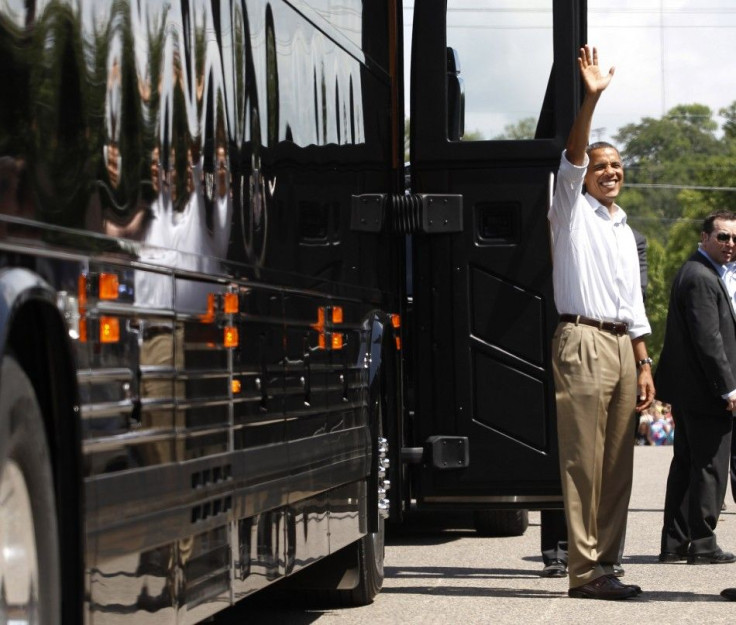On Bus Tour, Obama Shifts Blame to Republicans

President Barack Obama sought on Tuesday to turn voter anger over the economy toward Republicans in the U.S. Congress as he courted rural Americans in a campaign-style bus tour through a key election state.
Obama announced steps -- including a $350 million plan for rural businesses -- to boost hiring in farm communities, his latest effort to fight an unemployment rate stuck at over 9 percent despite earlier White House job initiatives.
The Democratic president portrayed Republicans as blocking measures that could help mend the economy.
"We could do even more if Congress is willing to get in the game," he said, referring to job-creation measures he is pushing for in free trade, payroll taxes and road construction.
"The only thing that is holding us back is our politics. The only thing that is preventing us from passing the bills I just mentioned is the refusal of a faction in Congress to put country ahead of party, and that has to stop," Obama said. "Our economy can't afford it."
As he spoke, Texas Governor Rick Perry was a few miles to the north in Dubuque, Iowa, campaigning for the Republican nomination to run against Obama next year.
Together with former Massachusetts Governor Mitt Romney and Congresswoman Michele Bachmann, Perry has emerged as one of the leading candidates to challenge Obama in 2012.
Obama's re-election, seen by commentators as highly probable several months ago, now faces a tougher climb because of the persistently high U.S. unemployment rate despite his big spending and stimulus programs.
Public approval of Congress has also sunk to record lows in recent polls. The president is taking every chance to distance himself from anger about political gridlock in Washington, where Republicans and Democrats fought bitterly about raising the debt ceiling and narrowly averted default this month.
BACK ROADS
Obama began his three-day road trip in Minnesota, Iowa and Illinois -- states he won in the 2008 election -- on Monday to press his case for the need to stoke job creation nationwide.
He has since traveled more than 300 miles (500 km) through backroads of the rural Midwest on a $1.1 million, jet-black bus with blacked-out windows and flashing police lights that stood out sharply against bucolic towns and expansive farmlands.
The slow-rolling journey exposed the president to voters who, polls suggest, are furious about the Washington impasse that prompted a U.S. credit rating downgrade by Standard & Poor's.
Although he was challenged by Tea Party supporters on Monday, the crowds Obama has faced so far have been mainly friendly. Many have urged him to take a tougher line against the Republicans and push forward policies to help the economy.
Obama acknowledged on Tuesday the government had a limited role to play in the economy, and in some cases did things that were "boneheaded," but stressed there were steps Washington could take to help businesses regain confidence and momentum.
"The prime driver of economic growth and jobs is going to be our people and the private sector and our businesses. But you know what? Government can help. Government can make a difference," he said.
Obama intends to put forward a specific plan for economic growth when Congress returns from recess in September.
But his options may be limited by a divided Congress, where Republicans control the House of Representatives and oppose any significant spending measures to stimulate growth. Democrats control the Senate.
He spent much of Tuesday at a rural economic forum in Iowa where he unveiled $350 million in funding for small businesses over 5 years -- not the big plan to be presented to Congress.
After taking part in brainstorming sessions with farmers, small business owners and local officials, Obama said he was glad to discuss policy options in a venue where "I had no idea who was Democrat, who was Republican, who was independent."
"In Washington, you'd think that the only two ways of thinking about our problems is either government is terrible and it has to be basically eliminated, or government is the answer to every problem," he said.
© Copyright Thomson Reuters 2024. All rights reserved.











